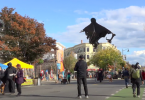By Alex Hemmer
BU News Service
BOSTON — Law enforcement officials are among the many groups whose lives have been made easier by the advancement of technology. Of the many tools now available to help protect Americans from crime, facial recognition technology has played an especially prominent role.
According to a report by the United States Government Accountability Office, the FBI is said to have delivered 50,000 facial recognition search results to law enforcement during the 2018 fiscal year. In Massachusetts alone, millions of state-issued driver’s license photos have reportedly been scanned in an effort to identify crime suspects for police investigations. State and local law enforcement agencies gained access to 331 license photos in 2015, which turned up matches for 101 possible suspects, according to statistics obtained by the Globe.
In another case that happened last year, state police analysts used facial recognition to help identify the suspects when the Framingham Police Department asked for help in identifying four people believed to have been involved in an armed robbery, according to Boston Herald.
Massachusetts State Police spokesman David Procopio said in June 2019 that they utilize facial recognition technology software as a tool that can help investigators identify unknown suspects and seek justice for their victims while taking offenders off the street.
“It is important to note that facial recognition is only one tool utilized during the course of a criminal investigation,” Procopio added.
Massachusetts State Police did not respond to repeated attempts for comment.
Still, its use has received significant push-back from both politicians and nonprofit organizations who are concerned with the lack of regulations surrounding the government’s use of the technology. Many worry that the ability to draw from a database of photographs, like state-issued IDs, could lead to an invasion of privacy.
Together with its lawsuit against the federal government in October, ACLU Massachusetts also launched a campaign in June 2019 known as “Press Pause on Face Surveillance,” which aims to spread awareness among the public on how the government’s reliance on facial recognition technology could threaten civil liberties.
“When people know they’re being watched, they are less prone to exercise their rights,” Emiliano Falcon, Policy Counsel for the ACLU’s Technology for Liberty program said. “This is a famous thing called the chilling effect.”
The “chilling effect” is a legal concept that suggests how people may be less confident in their rights to free speech and other rights protected by the First Amendment when they feel targeted.
“If you know you are being watched, then you might not go to a protest [or] go to get an abortion, or whatever other rights you have,” Falcon added.
Apart from concerns with privacy invasion, ACLU’s lawsuit also pointed out that face surveillance technology could especially endanger people of color.
“There are serious questions about the reliability of biometric identification technologies,” the complaint filed in October stated before emphasizing people of color as the group most at risk. “These technologies
The worries may be warranted by research that was conducted by Joy Buolamwini, an MIT graduate student who discovered that dark-skinned women were 33.9% more likely to be misidentified by facial recognition software than light-skinned men.
Further research by Buolamwini also revealed that the technology had misidentified Oprah Winfrey, Serena Williams and Michelle Obama as men, with one software questioning whether the photo of the former First Lady was of a “young man” who might be wearing a “hairpiece.”
Amara Majeed, a student at Brown University, fell victim to photo misidentification herself when she was wrongly accused of a terrorist attack in Sri Lanka last April.
Majeed, a dark-skinned Muslim American who grew up in Maryland, was mistaken by the Sri Lankan police as local terrorist suspect Abdul Cader Fathima Qadiya after a photo from her Facebook profile found its way to the police investigation.
Considering both the reliability of the technology as well as the personal safety of its citizens, more and more municipal governments across the country have moved to ban its use in law enforcement.
Last summer, Somerville became the first city in Massachusetts — as well as one of the first in the nation — to ban using the technology in government. By a vote of 11 to 0, Somerville City Council banned the use of facial recognition technology in police investigations and municipal surveillance programs.
Councilor Ben Ewen-Campen, who helped sponsor the bill in June, shared the widespread concerns regarding the lack of policies regulating the use of the technology in law enforcement.
“I believe that today, too many major decisions around law enforcement and surveillance technology are made behind closed doors, with no public debate or awareness, and I think this should change,” he explained.
Still, Ewen-Campen doesn’t oppose the government’s use of facial recognition technology altogether. He added that the public should be able to participate in the decision-making process.
“This is why I wrote Somerville’s Surveillance Technology Oversight Ordinance, that will require any usage of surveillance technology to be approved by the City Council, with the chance for the public to weigh in pros and cons,” he said.
Despite his willingness to consider the benefits of facial surveillance on a case-by-case basis, Ewen-Campen remained committed to a full ban “until there are robust, transparent guidelines and regulations at the State and Federal level.”






Interesting post, Thanks for Sharing.